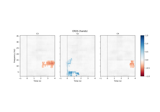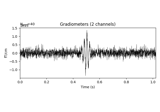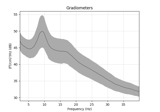mne.time_frequency.tfr_multitaper¶
-
mne.time_frequency.tfr_multitaper(inst, freqs, n_cycles, time_bandwidth=4.0, use_fft=True, return_itc=True, decim=1, n_jobs=1, picks=None, average=True, verbose=None)[source]¶ Compute Time-Frequency Representation (TFR) using DPSS tapers.
Same computation as
tfr_array_multitaper, but operates onEpochsobjects instead ofNumPy arrays.- Parameters
- inst
Epochs|Evoked The epochs or evoked object.
- freqs
ndarray, shape (n_freqs,) The frequencies in Hz.
- n_cycles
float|ndarray, shape (n_freqs,) The number of cycles globally or for each frequency. The time-window length is thus T = n_cycles / freq.
- time_bandwidth
float, (optional), default 4.0 (n_tapers=3) Time x (Full) Bandwidth product. Should be >= 2.0. Choose this along with n_cycles to get desired frequency resolution. The number of good tapers (least leakage from far away frequencies) is chosen automatically based on this to floor(time_bandwidth - 1). E.g., With freq = 20 Hz and n_cycles = 10, we get time = 0.5 s. If time_bandwidth = 4., then frequency smoothing is (4 / time) = 8 Hz.
- use_fftbool, default
True The fft based convolution or not.
- return_itcbool, default
True Return inter-trial coherence (ITC) as well as averaged (or single-trial) power.
- decim
int|slice, default 1 To reduce memory usage, decimation factor after time-frequency decomposition. If
int, returns tfr[…, ::decim]. Ifslice, returns tfr[…, decim].Note
Decimation may create aliasing artifacts.
- n_jobs
int The number of jobs to run in parallel (default 1). Requires the joblib package.
- picks
str|list|slice|None Channels to include. Slices and lists of integers will be interpreted as channel indices. In lists, channel type strings (e.g.,
['meg', 'eeg']) will pick channels of those types, channel name strings (e.g.,['MEG0111', 'MEG2623']will pick the given channels. Can also be the string values “all” to pick all channels, or “data” to pick data channels. None (default) will pick good data channels.- averagebool, default
True If
Falsereturn anEpochsTFRcontaining separate TFRs for each epoch. IfTruereturn anAverageTFRcontaining the average of all TFRs across epochs.Note
Using
average=Trueis functionally equivalent to usingaverage=Falsefollowed byEpochsTFR.average(), but is more memory efficient.New in version 0.13.0.
- verbosebool,
str,int, orNone If not None, override default verbose level (see
mne.verbose()and Logging documentation for more). If used, it should be passed as a keyword-argument only.
- inst
- Returns
- power
AverageTFR|EpochsTFR The averaged or single-trial power.
- itc
AverageTFR|EpochsTFR The inter-trial coherence (ITC). Only returned if return_itc is True.
- power
See also
Notes
New in version 0.9.0.


